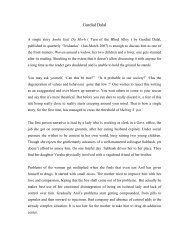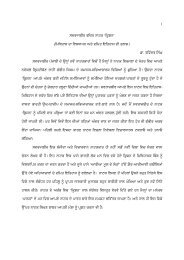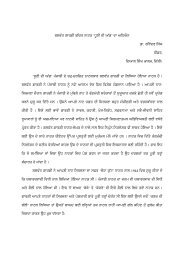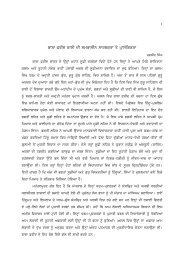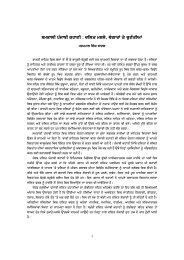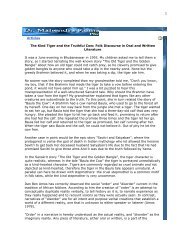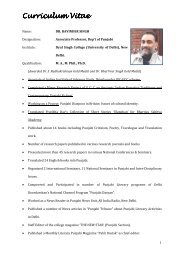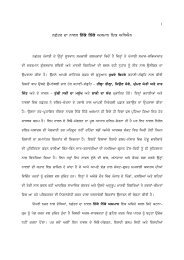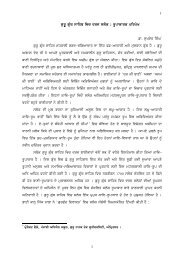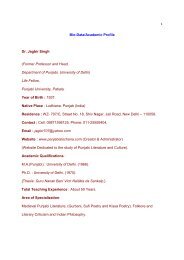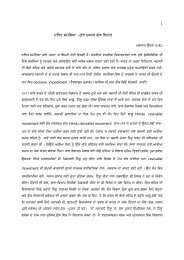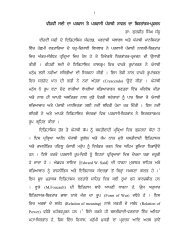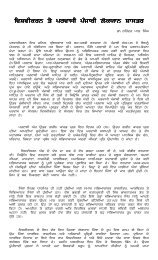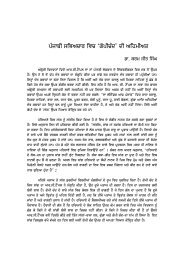Dialogue Among Civilizations-Kapil Kapoor-23 ... - Panjabi Alochana
Dialogue Among Civilizations-Kapil Kapoor-23 ... - Panjabi Alochana
Dialogue Among Civilizations-Kapil Kapoor-23 ... - Panjabi Alochana
You also want an ePaper? Increase the reach of your titles
YUMPU automatically turns print PDFs into web optimized ePapers that Google loves.
The opposition between monotheism and pluri-theism has been the other rich source of culturalclash and conflict. There is this philosophic monism and theological monotheism. It is inopposition to pluralism and pluri-theism. The imperative of one God is the imperative of myGod as against yours and of my one God against your gods. My God is true and your God isfalse; my God is light, your gods are darkness.The theological monism, the presence of one God, is at the root of the conflict model of humanprogress so clearly visible in the western culture.It is significant that in the Western tradition, ‘knowledge’ has been opposed to innocence, isassociated with ‘power’ and leads to the Fall of man. The Renaissance marked theontological shift from God to Man/Nature and the epistemological shift from verbal authorityand experience to reason and experiment. What is, however, common throughout the Westernhistory of ideas is the man-centered world-view. In the middle ages, God is the object ofstudy for the sake of man, for his Redemption. Renaissance onwards, focus shifts to Nature asthe object of study for the sake of man. It is interesting that a marked adversarial axis hasalways obtained between the western man and his object of study. It is almost as if man isalways threatened by, or is at the least in the presence of, an adversary who has to be subduedor neutralised or used in the interest of man.Internally, within the Western society, God entered into this adversarial relationship with man– seeking obedience from him, punishing him [10] in the Middle Ages. Now Nature becomesthe great adversary and the new knowledge, Science, is put to service to bend nature to man’spurpose. In the nineteenth century, it is man or a class of men against man or a class of menin the class-war of the Marxist doctrine, and now in the twentieth century it is woman againstman. The Hebraic man-centered view that subordinates everything to man’s comfort is theobvious foundation for this conflict model that informs practically all the western disciplinarycodes - sociological, economic, and political and is at the heart of the Darwinian evolutionarythought as well.Externally, the other has been the adversary. He is enveloped in darkness and it is the missionof the believers to evangelise by proselytising. Knowledge is an instrument of power in thisconflict model, an instrument to handle the ‘adversary’. In the Old Testament, we havealready noted, man is given “dominion over the fish of the sea, and over the fowl of the air,and over the cattle, and over all the earth….” [11] The Western man has been granted thisdominion and has treated it as a matter of his right to maintain and extend this dominion. Therise of sciences and the new power of technology are now put to this end. And as the Westernhistory shows, this ‘organised’ knowledge has often proved destructive. Its power rests on theauthority of ‘truth’ it attains through societal and institutional support. At a given time in theWestern history, there has always been a dominant ‘truth’ of the time. This is theconsequence of the Hebraic monistic imperative. There is in the western mind, a monisticimperative – a ‘truth’ at a time. Between the dichotomies, only one is true and has to becognised and then adhered to. This imperative is driven by the uncompromising monism ofthe Hebraic worldview. [12] Only one step from this is the drive to convert, failing which, todestroy the other.Thus the monistic, monotheistic, bibliolatrous, institutionalized cultures form one set. Thepluralistic, pluri-theistic, idolatrous, non-institutionalized cultures form the other set. The firstset, considering their history, may be designated as ‘predators’; the second set similarly maybe designated as ‘fodder’. The only exception, the Jews, have moved out of their native



